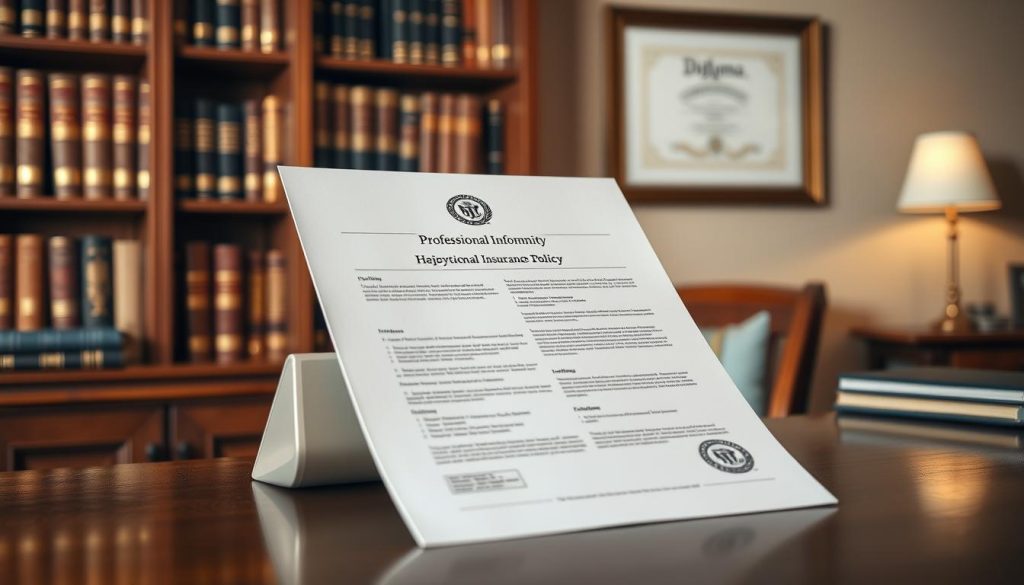Are you confident that your family’s financial future is secure? As a professional, you understand the importance of being prepared for the unexpected. Protecting your assets and securing your loved ones’ well-being is crucial, but many professionals overlook the necessary steps to achieve this.
Having the right insurance and estate planning strategies in place can provide peace of mind and financial security. It’s not just about having a plan; it’s about having the right plan tailored to your unique needs as a professional.
Key Takeaways
- Understand the importance of insurance and estate planning for professionals.
- Learn how to protect your assets and secure your family’s future.
- Discover the benefits of having a tailored insurance and estate plan.
- Find out how to ensure your plan is aligned with your professional goals.
- Gain insights into the key elements of a comprehensive insurance and estate plan.
Why Insurance and Estate Planning for Professionals Matters
Professionals, such as doctors and lawyers, face unique risks that can significantly impact their careers and personal finances. These risks can lead to financial losses, damage to reputation, and even business closure if not properly managed.
Unique Risks in Professional Careers
Professional careers come with distinct risks, including malpractice claims, business interruption, and personal liability. For instance, a doctor may face a malpractice lawsuit, while a lawyer may be held liable for professional negligence.
According to a recent study,
“64% of small businesses experienced a significant disruption in the past year, with 40% of those disruptions resulting in financial losses.”
This highlights the importance of having adequate insurance coverage to mitigate such risks.
The Cost of Inadequate Planning
Inadequate insurance and estate planning can have severe consequences, including financial ruin and business closure. The table below illustrates the potential costs associated with inadequate planning.
| Risk | Potential Cost |
|---|---|
| Malpractice Claim | $100,000 – $1,000,000 |
| Business Interruption | $50,000 – $500,000 |
| Personal Liability | $20,000 – $200,000 |
By understanding these risks and having the right insurance and estate planning strategies in place, professionals can protect their assets and ensure the continuity of their businesses.
Essential Insurance Coverage Options for Professionals
Professionals face unique risks that require specialized insurance coverage options to protect their careers and businesses. Understanding these options is crucial for mitigating potential risks and ensuring business continuity.
Professional Liability/Indemnity Insurance
Professional liability insurance, also known as indemnity insurance, protects professionals against claims of negligence, errors, or omissions in their work. This type of insurance is essential for professionals who provide advice or services that clients rely on.
Coverage Limits and Policy Features
When selecting professional liability insurance, it’s crucial to consider the coverage limits and policy features. Higher coverage limits can provide greater protection, but may also increase premiums. Policy features such as retroactive coverage and defense costs outside the policy limit can also significantly impact the effectiveness of the insurance.

Key Person and Business Continuation Insurance
Key person insurance provides financial protection to a business in the event of the death or incapacitation of a key individual. Business continuation insurance helps ensure that the business can continue to operate smoothly during such events. These insurance types are vital for businesses that rely heavily on specific individuals.
Disability and Business Overhead Protection
Disability insurance provides income replacement for professionals who become unable to work due to illness or injury. Business overhead protection insurance covers the operating expenses of a business if the owner becomes disabled. These insurance options help professionals maintain their financial stability during challenging times.
By understanding and leveraging these essential insurance coverage options, professionals can better protect their practices and ensure long-term success.
Core Estate Planning Strategies for Professionals
As a professional, having a comprehensive estate plan is essential for managing your assets and business interests effectively. Estate planning is not just about distributing assets after one’s passing; it’s a proactive approach to securing your financial future and that of your loved ones.
Developing a Comprehensive Will
A well-crafted will is the cornerstone of any estate plan. It outlines how your assets should be distributed and can include specific bequests, charitable donations, and arrangements for the care of minor children. Professionals should ensure their will is updated regularly to reflect changes in their personal and professional lives.
Trust Structures for Asset Protection
Trusts are versatile tools in estate planning, offering asset protection, tax benefits, and control over the distribution of assets. There are various types of trusts, each serving different purposes.
Revocable vs. Irrevocable Trusts
Revocable trusts allow the grantor to make changes or revoke the trust during their lifetime, providing flexibility. In contrast, irrevocable trusts are more rigid but offer greater asset protection and tax advantages. Professionals must carefully consider their needs when choosing between these options.
Specialized Trusts for Professionals
Specialized trusts, such as those designed for business succession or charitable giving, can be tailored to meet the unique needs of professionals. These trusts can help in transferring business interests, reducing tax liabilities, and supporting philanthropic goals.
Advance Directives and Powers of Attorney
Advance directives and powers of attorney are critical components of a comprehensive estate plan. They ensure that your healthcare and financial decisions are made according to your wishes if you become incapacitated. Professionals should designate trusted individuals to act on their behalf.
Asset Protection Techniques for Your Professional Practice
Asset protection is a vital component of a comprehensive business strategy for professionals. It involves various techniques to safeguard your practice from potential risks and financial losses. According to a recent survey, “many professionals overlook the importance of asset protection until it’s too late.”

Business Entity Selection and Legal Structures
Choosing the right business entity is crucial for asset protection. Different legal structures offer varying levels of protection against creditors and lawsuits. An estate planning attorney can help you navigate these options.
LLCs, Professional Corporations, and Partnerships
LLCs, professional corporations, and partnerships are popular business entities among professionals. For instance, LLCs offer flexibility and protection for personal assets, while professional corporations may provide tax benefits. Partnerships allow for shared responsibility and risk management.
Separating Personal and Business Assets
Separating personal and business assets is another key asset protection strategy. This can be achieved by maintaining separate bank accounts, avoiding commingling of funds, and ensuring that business transactions are conducted formally. As noted by financial experts,
“separating personal and business finances is essential for protecting personal assets in case of business-related lawsuits.”
By implementing these asset protection techniques, professionals can significantly reduce their exposure to financial risks. It’s essential to consult with an estate planning attorney to determine the best asset protection strategies for your specific situation.
Insurance and Estate Planning for Professionals: A Comprehensive Approach
A comprehensive approach to insurance and estate planning is crucial for professionals to safeguard their assets and secure their financial future. By integrating these two critical components, professionals can ensure that they are adequately protected against unforeseen risks and that their wealth is preserved for future generations.
Integrating Insurance with Estate Planning
Integrating insurance with estate planning allows professionals to create a robust financial strategy. Insurance planning services can provide the necessary funds to pay estate taxes, thereby preventing the need to liquidate assets. This integration ensures that the professional’s estate is distributed according to their wishes, without undue financial burden on their heirs.
By combining insurance with estate planning, professionals can also ensure that their business or practice continues uninterrupted in the event of their death or disability. This comprehensive approach helps in maintaining the continuity of their professional endeavors.
Tax Considerations and Strategies
Effective wealth preservation techniques involve minimizing tax liabilities. Professionals can benefit from various tax strategies, such as gifting assets to trusts or utilizing tax-deferred vehicles. It’s essential to consult with a tax professional to optimize these strategies and ensure compliance with current tax laws.
By understanding and leveraging these tax considerations, professionals can maximize their wealth preservation and ensure that their estate planning goals are achieved efficiently.
Succession Planning for Your Professional Practice
Planning for the future of your professional practice involves more than just financial planning; it includes succession planning. Succession planning is crucial for ensuring the continuity and success of your practice beyond your involvement.
Effective succession planning requires a proactive approach, starting with identifying and preparing potential successors. This involves assessing the skills and competencies required for the future leadership of your practice and developing a plan to nurture and transition these responsibilities.
Identifying and Preparing Potential Successors
Identifying potential successors within your organization is a critical step. It involves evaluating the strengths and weaknesses of your team members and providing them with the necessary training and development opportunities to take over future leadership roles.
- Assess the skills and competencies required for future leadership.
- Develop a training plan to nurture potential successors.
- Regularly review and update your succession plan.
Buy-Sell Agreements and Funding Methods
A buy-sell agreement is a critical component of succession planning, ensuring that your share of the practice is transferred according to your wishes in the event of your retirement, death, or disability. Funding these agreements often involves life insurance and other financial instruments.
Key considerations for buy-sell agreements include:
- Determining the funding mechanism.
- Establishing the valuation method for your practice.
- Regularly reviewing and updating the agreement.

By integrating succession planning into your overall estate plan, you can ensure a smooth transition and protect your professional legacy. Consulting with an estate planning lawyer can provide valuable insights and help tailor a succession plan that meets your specific needs.
Conclusion
As a professional, your career is not just a source of income, but also a significant part of your legacy. Insurance and estate planning are crucial components in safeguarding this legacy, ensuring that your hard work and dedication continue to benefit you and your loved ones for years to come.
By integrating insurance coverage with comprehensive estate planning solutions, you can create a robust financial plan that addresses your unique needs and goals. This includes leveraging estate planning services to develop a tailored strategy that protects your assets, minimizes tax liabilities, and secures your financial future.
Ultimately, taking a proactive and comprehensive approach to insurance and estate planning enables you to maintain control over your professional practice and personal assets. Seeking guidance from experienced professionals who specialize in estate planning services can help you navigate the complexities and create a personalized plan that aligns with your objectives.

Leave a Reply